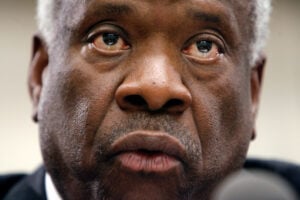Clarence Thomas's Piss-Ass Excuse For Not Disclosing Megadonor Real Estate Sale
So, is Clarence Thomas a bad faith actor or just not very good at this interpreting the law thing?

(Photo by Chip Somodevilla/Getty Images)
Supreme Court justice Clarence Thomas’s judicial career has seemingly been a never-ending cycle of ethics scandals. But seeing as a lifetime appointment requires 67 senators with a backbone for anything to happen, Thomas has continued in his powerful position.
The latest ethics scandal comes to us in two parts — ProPublica initally released an article detailing the two decades of Justice Thomas receiving travel and other gifts from GOP megadonor Harlan Crow. A few days later, we got more details of the financial entanglement between the two men as it was revealed Crow bought from Thomas three pieces of property — including one Thomas’s mother lives on — and improved it, all with Thomas’s mother never paying rent.

Is The Future Of Law Distributed? Lessons From The Tech Adoption Curve
And yeah… Thomas never disclosed the transaction.
Now CNN reports Thomas will amend his financial disclosures.
The source said Thomas has always filled out his forms with the help of aides, and that it was an oversight not to report the real estate transaction. Thomas believed he didn’t have to disclose because he lost money on the deal, according to the source.
Thomas will review the forms and amend as appropriate, the source said.
Sponsored

The Business Case For AI At Your Law Firm


Is The Future Of Law Distributed? Lessons From The Tech Adoption Curve

Early Adopters Of Legal AI Gaining Competitive Edge In Marketplace

Legal AI: 3 Steps Law Firms Should Take Now
I guess that’s how powerful people say “my bad.”
Gabe Roth of Fix the Court points out how very clear the disclosure requirement is:
“He should have listed the transaction in Part VII of his 2014 disclosure, but he didn’t,” Roth said in an email.
“If you’re a Supreme Court justice, and you sell a property you own, you have to list the transaction in your annual disclosure. That’s the law — even if Justice Thomas lost money, and even if the sale was to build a museum one day,” Roth said.
“The public has every right to know when top officials are buying and selling property,” Roth added.
Reminder, as one of the nine final arbiters of justice in this country, Thomas is not anti-consequence. Indeed, as Professor Leah Litman correctly points out, his recent jurisprudence places the fault of state-appointed lawyers on defendants. But an elite trained judge who’s been on the highest court in the country for 30 years can just offer a shrug emoji when they mess up the law?
Sponsored

Legal AI: 3 Steps Law Firms Should Take Now

Navigating Financial Success by Avoiding Common Pitfalls and Maximizing Firm Performance
How very “consequences for thee, but not for me” of him.
Though there are possible ramifications for Thomas, and Democrats are making noises about them, given the massive political lift it would require, well, I wouldn’t hold my breath.
Sen. Sheldon Whitehouse of Rhode Island and Rep. Hank Johnson of Georgia have led about two dozen Democratic members of Congress in asking Chief Justice John Roberts to launch an investigation, and they are calling on the Judicial Conference – a policymaking body for the federal courts – to refer Thomas to the US attorney general for potential violations of the Ethics in Government Act of 1978.
“There is at least reasonable cause to believe that Justice Thomas intentionally disregarded the disclosure requirement to report the sale of his interest in the Savannah properties in an attempt to hide the extent of his financial relationship with Crow,” Whitehouse and Johnson said in a joint statement.
Fundamentally, there are two options here — neither of which make Clarence Thomas look good. Either Thomas is a bad faith actor who intentionally left this questionable real-estate deal off of his disclosures because he didn’t want the heat it would bring. Or, a Supreme Court justice cannot understand a pretty straightforward law. That’s not better for the justice.
 Kathryn Rubino is a Senior Editor at Above the Law, host of The Jabot podcast, and co-host of Thinking Like A Lawyer. AtL tipsters are the best, so please connect with her. Feel free to email her with any tips, questions, or comments and follow her on Twitter @Kathryn1 or Mastodon @Kathryn1@mastodon.social.
Kathryn Rubino is a Senior Editor at Above the Law, host of The Jabot podcast, and co-host of Thinking Like A Lawyer. AtL tipsters are the best, so please connect with her. Feel free to email her with any tips, questions, or comments and follow her on Twitter @Kathryn1 or Mastodon @Kathryn1@mastodon.social.







